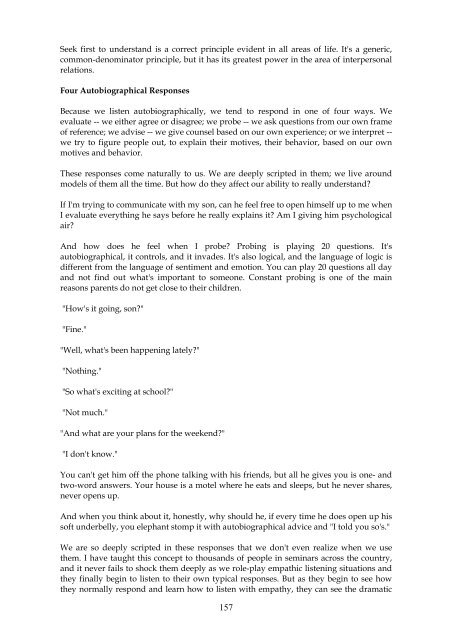Covey - The 7 habits of highly effective people
Create successful ePaper yourself
Turn your PDF publications into a flip-book with our unique Google optimized e-Paper software.
Seek first to understand is a correct principle evident in all areas <strong>of</strong> life. It's a generic,<br />
common-denominator principle, but it has its greatest power in the area <strong>of</strong> interpersonal<br />
relations.<br />
Four Autobiographical Responses<br />
Because we listen autobiographically, we tend to respond in one <strong>of</strong> four ways. We<br />
evaluate -- we either agree or disagree; we probe -- we ask questions from our own frame<br />
<strong>of</strong> reference; we advise -- we give counsel based on our own experience; or we interpret --<br />
we try to figure <strong>people</strong> out, to explain their motives, their behavior, based on our own<br />
motives and behavior.<br />
<strong>The</strong>se responses come naturally to us. We are deeply scripted in them; we live around<br />
models <strong>of</strong> them all the time. But how do they affect our ability to really understand?<br />
If I'm trying to communicate with my son, can he feel free to open himself up to me when<br />
I evaluate everything he says before he really explains it? Am I giving him psychological<br />
air?<br />
And how does he feel when I probe? Probing is playing 20 questions. It's<br />
autobiographical, it controls, and it invades. It's also logical, and the language <strong>of</strong> logic is<br />
different from the language <strong>of</strong> sentiment and emotion. You can play 20 questions all day<br />
and not find out what's important to someone. Constant probing is one <strong>of</strong> the main<br />
reasons parents do not get close to their children.<br />
"How's it going, son?"<br />
"Fine."<br />
"Well, what's been happening lately?"<br />
"Nothing."<br />
"So what's exciting at school?"<br />
"Not much."<br />
"And what are your plans for the weekend?"<br />
"I don't know."<br />
You can't get him <strong>of</strong>f the phone talking with his friends, but all he gives you is one- and<br />
two-word answers. Your house is a motel where he eats and sleeps, but he never shares,<br />
never opens up.<br />
And when you think about it, honestly, why should he, if every time he does open up his<br />
s<strong>of</strong>t underbelly, you elephant stomp it with autobiographical advice and "I told you so's."<br />
We are so deeply scripted in these responses that we don't even realize when we use<br />
them. I have taught this concept to thousands <strong>of</strong> <strong>people</strong> in seminars across the country,<br />
and it never fails to shock them deeply as we role-play empathic listening situations and<br />
they finally begin to listen to their own typical responses. But as they begin to see how<br />
they normally respond and learn how to listen with empathy, they can see the dramatic<br />
157


